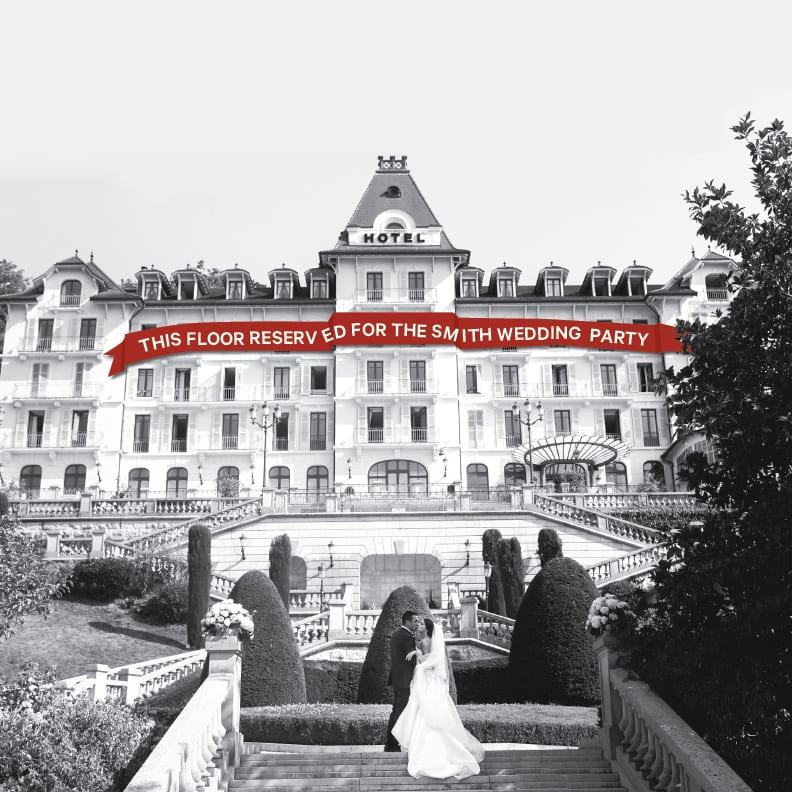
You think getting a good rate for a top-notch hotel room is tough? Try booking for 50 couples all at one time.
For most wedding couples, the dream is to invite guests to a luxe hotel where the rates are reasonable and everyone’s on the same floor. Nice idea, but you need to plan early in the wedding-planning process — and not just to get the best deals. By having one single hotel (or just a few) where all guests stay, you make it easier to plan transportation throughout your wedding day and to communicate wedding information in general.
“Reserving hotel room blocks is the best way to ensure your guests have a place to stay near your reception — plus, it’s more fun for your guests to be near other wedding guests,” explains Robin Hogge, Director of Sales at Hotel Weyanoke in Farmville, Virginia. “A room block saves you time, money and ensures that all of your guests will have a place to stay during your event.”
What are the average savings when booking hotel room blocks?
On average, group rates are 15% to 25% lower than standard rates, or around $30 to $50 off each room each night, so it’s also a nice perk to give your guests who are likely already spending a lot to be part of your special day. You might even be able to save more if you use a wedding planner — they may have a partnership with the hotel and can score you a greater discount or a suite night comped for your wedding night.
How does a hotel room block work?
Most hotels have a policy where you have to set aside at least 10 rooms to qualify for a room block at a discounted rate. But many hotels book out pretty far in advance, which means you’ll want to start booking or reserving your room blocks at least six months ahead of your big day, and ideally as early as possible. Additionally, you’ll want to consider whether or not there’s a major event going on around the area of your hotels during that same weekend. “Most cities are known for booking large sports groups and conferences, which is great for the city, but not so great on your wedding weekend,” explains Hogge, who also notes that, when a hotel is in high demand, it is harder for them to be flexible with room rates.
How far in advance of the wedding should hotel rooms be arranged?
To score the best deal, Lauren Grech, CEO & Co-Founder of LLG Events & LLG Agency, and Adjunct Professor at New York University, recommends that couples set their hotel blocks up one year in advance of their wedding date, or ideally when you send out “Save The Dates.”
“This way, you can incorporate the accommodation information on this stationery or your wedding website,” she says. To set up your hotel block, she suggests visiting the hotel’s website and filling out an RFP (request for proposal), or contacting the hotel and asking to speak to someone in group sales. “Let them know you are looking for a courtesy block for your wedding, and then they will walk you through the process,” she says. If you hired a wedding planner, this can be his or her task, as it’s more likely for a hotel to give them access to its internal booking system rather than some random couple.
No wedding planner? There are a number of services for booking wedding block leads, like Cvent and The Knot. HotelPlanner.com boasts that it can provide the following:
- Fast quotes
- Guaranteed lowest group rates
- A dedicated local planner
- Free hotel room vouchers
- A free room for the group coordinator
- You can book as a group but pay the hotel separately
But even if you know exactly which hotel(s) you want for your guests, Hammer still suggests calling them directly to make sure you’re asking and getting answers to all the important questions upfront.
What do you need to book a hotel block?
Surprisingly, the process of booking a hotel block is a lot more complicated than it seems. That’s because you need to know a lot of information beforehand, including a good estimate of how many rooms you’ll need so you contract enough to meet your guests’ needs.
However, Leah Elkind, Sales and Catering Coordinator at The Inn at Rancho Santa Fe, warns that you don’t want to overbook the rooms and wind up well below your minimum commitment. “A credit card authorization must also be completed along with signing the contract so that a form of payment is on file for any rooms that the group would like to pay for or for attrition if applicable.”

How does a typical hotel room block contract work?
There are two different types of contracts that are typically used — a standard group contract and a courtesy agreement.
“The courtesy agreement does not require any financial obligation or guarantee; however, courtesy agreements are more limited in terms of number of rooms, room types, availability of rooms without substantial utilization (or pickup) of the rooms,” explains Tim Hammer, the director of sales and marketing at Kimpton Hotel Monaco Portland and Kimpton RiverPlace Hotel, both in Portland, Oregon.
“A standard group contract allows parties to guarantee room types, block an increased number of rooms, and have access to more perks such as food and beverage credits, access to our local partners and discounts, and a dedicated Conference Services Manager to help coordinate any special group requests, amenities, room drops, etc.,” said Hammer.
Can you negotiate a room block rate?
Like most aspects of booking wedding vendors, there’s certainly room for negotiation when it comes to scoring the best rate for your guests. In fact, once a rate is offered by the hotel sales person, Hogge suggests asking whether or not that’s the best possible rate they can offer — or, if you want to stay at a specific hotel and the one across the street is offering you a lower rate, “You could say ABC hotel is offering this rate, can you match it or do a little better?” Other factors may come into play that can give you a leg up on lowering the rate include the time of year and hotel availability.
What questions should be asked when reserving?
Once you’ve settled on a rate you’re (hopefully) happy with, it’s time to seal the deal — but not before covering all the grounds. Here are some key questions you’ll want to ask before finishing up your hotel block reservation.
- Do you have facilities for hosting pre- or post-wedding events onsite?
- Is there a bar and restaurant onsite? What are the hours?
- What is the group rate, including taxes and fees?
- Is there a fee for parking?
- Does the parking fee include in/out privileges?
- What time are check-in and check out? What is the policy on early check-in or late check-out?
- Do you offer a courtesy block/agreement?
- What is the maximum number of rooms available?
- If additional rooms are needed, can we add them to the block? Would it be the same cut-off date?
- What kinds of hotel amenities does the property offer?
- Is there a charge to deliver guest welcome bags?
Do your best to ensure that each of the hotels you’re working with are given the same information that’s required for your wedding day. Don’t forget that you’ll need to coordinate logistics with each point person at each hotel if you do not have a wedding planner handling all of this for you.
There’s much to think about in regards to transportation. For example, if you have multiple-tiered hotel options (various prices at various places for your guests), Grech explains that you’ll need to include the time it takes to travel from hotel to hotel, so the amount of planning overhead is a lot more work. “You should also be coordinating your rehearsal dinner and/or farewell brunch within one of these hotels, so that’s technically two more events to coordinate, with additional transportation and logistics,” she says. “Many couples forget these additional details if trying to manage their hotel room blocks all themselves.”
Should you book rooms for your guests, or should they book rooms themselves?
To make sure you’re not squandering a couple thousand dollars at the end of your wedding weekend, it’s best to let your guests book the rooms themselves. “Typically wedding guests will pay for their rooms on their own, so they should make their own reservations since a credit card guarantee is required for all reservations,” says Elkind.
Watch out for penalties
If you do decide to make reservations on your guests’ behalf, she recommends communicating this with those guests so that you can avoid duplicate reservations (and possible late cancellation or no-show fees that could result from this). In some cases, there are penalties for unbooked rooms. This depends on the style of contract or Room Block Agreement that is executed between the parties. “A traditional contract usually allows for 20 percent of the contracted rooms to fall or slip 21 days prior to arrival, leaving the couple responsible financially for 80 percent of the contracted room revenue,” says Stacie Colbert, Director of Sales and Marketing for South Congress Hotel and Hotel Ella in Austin, Texas. “A courtesy agreement, on the other hand, often has a cut-off date 60 to 90 days prior to arrival so that the hotel can reattempt to resell any inventory that isn’t reserved within the block.” This type of agreement, she explains, is most advantageous to the couple as they are not on the hook for unreserved rooms.
Are hotel chains good or bad for room block booking?
Going the hotel chain route is an easy way to ensure that the process of booking more one or more hotel blocks runs as smoothly as possible. They tend to have more formal systems in place and use many of the same internal booking systems to make the process more seamless for you and your soon-to-be spouse, as well as your wedding guests. Hilton, Marriott, Hyatt, and Omni are all great hotel chains — just be sure to do your homework and read recent reviews before booking a room block at any location.
What’s the best way to communicate hotel room block info to guests?
As important as reserving a hotel room block is, it’s equally important that you communicate the information to your guests effectively so that they can take advantage of it. The best way to go about letting your guests know about the accommodation options available to them, as well as any room discount provided to them by your booking a hotel block, is to include it all in the invitation — and, better yet, the “Save the Date.” Even if you have limited space, you can simply include your wedding website with the text “Accommodation information available at INSERT WEBSITE HERE.” On your website is where you can have a separate page outlining the accommodations available, including the room block information.
If you have the room to do this on your invite, you’ll want to say something along the lines of:
For your convenience, a block of rooms has been reserved at [name of hotel] in [city]. When calling to make your reservation, please mention the [your last names] wedding in order to receive a discounted rate. Please call [hotel’s phone number] to make your reservation.
Hogge urges couples to note all important dates or deadlines. “For example: Be sure to book your hotel room by [date] in order to receive the discount.”
Bottom Line
If you don’t reserve hotel room blocks early on, you and your wedding guests will have a much harder time finding available rooms and the prices will likely be higher than they need to be. Save some dough, and coordination headaches, before you’re in the thick of things.
Full disclosure: The Plunge partners with HotelPlanner.com.























